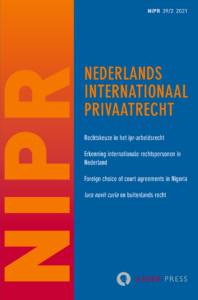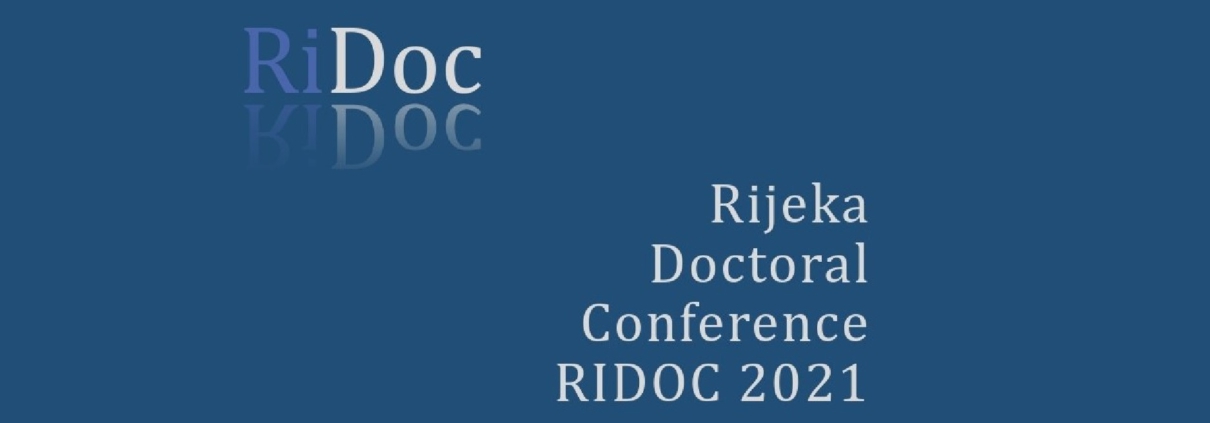Views
Nothing Found
Sorry, no posts matched your criteria
News
Issue 2021(2) Dutch PIL journal
 The second issue of 2021 of Dutch PIL journal, including both English and Dutch language papers, has just been published.
The second issue of 2021 of Dutch PIL journal, including both English and Dutch language papers, has just been published.
It includes these papers:
K.C. Henckel, Rechtskeuze in het ipr-arbeidsrecht: enkele gedachten over het begunstigingsbeginsel / p. 251-273
This article discusses the preferential law approach that is enshrined in Article 8(1) Rome I Regulation. This provision limits the effects of a choice of law in the sense that the choice may not deprive the employee of the protection afforded to him by the mandatory provisions of the law that would have applied in the absence of a choice. It is generally accepted that the law that is most favourable to the employee merits application. The determination of this preferential law requires a comparison between the chosen law and the law that would have applied in the absence of such a choice. The article examines the method of comparison used throughout Dutch case law which shows that a preferential law approach is rarely applied. Instead, the majority of judgments apply the mandatory provisions of the objectively applicable, Dutch, law without further explanation. Since the application of the preferential law approach seems to be plagued by ambiguity, this article questions the desirability and practical feasibility of the comparison between the chosen law and the mandatory provisions of the law that would have applied in the absence of such a choice.
L.C.J. van Apeldoorn, Erkenning van internationale rechtspersonen in het Nederlandse privaatrecht / p. 274-291
This article examines the grounds for the recognition of the legal personality of international legal persons in Dutch private law, focussing in particular on foreign states and international organizations. Based on an analysis of the decision of the Dutch Hoge Raad (Supreme Court) in UNRRA/Daan, it is argued that the legal personality of international organizations is recognised by means of the (analogous) application of a rule, codified in Article 10:119 of the Dutch Civil Code, according to which the legal personality of a corporation depends on its personal law. When considering the personal law of international organisations, which is public international law including the terms of the founding treaty, decisive is not whether the organisation is an international legal person, but whether it is granted, on the basis of public international law, legal personality in the legal orders of its member states. The rule governing the recognition of the legal personality of international organisations is not applicable to foreign states because public international law does not imply or require that states are afforded legal personality in municipal law. Rather, it is argued, the legal personality of foreign states is recognised on the basis of an unwritten rule of Dutch private international law, originating in international comity, that attributes legal personality to foreign states. The application of this rule coincides in practice with the application of another rule also originating in comity, requiring as a matter of public international law that foreign states are granted standing to be party to legal proceedings before municipal courts.
Okoli, An analysis of the Nigerian Court of Appeal’s decisions on foreign choice of court agreements in the year 2020 / p. 292-305
In Nigeria valid commercial contracts between parties are treated as sacrosanct and binding by Nigerian courts. It is however uncertain (unlike in the European Union) whether a valid foreign choice of court agreement, which is a term of the parties’ contract, will be enforced by Nigerian courts. In this connection, the decisions of Nigerian courts are not consistent. Nigerian courts have applied three approaches to the enforcement of foreign choice of court agreements – ouster clauses, the Brandon test, and the contractual approach. This article analyses the approach of Nigerian appellate courts to the enforcement of foreign choice of court agreements in light of three Court of Appeal decisions delivered in the year 2020.
latest phds, summary: Stuij, Iura novit curia en buitenlands recht. Een rechtsvergelijkend en Europees perspectief (dissertatie Erasmus Universiteit Rotterdam, 2021) (samenvatting proefschrift) / p. 306-311
This contribution is a short summary of a PhD thesis defended at Erasmus School of Law on April 29th, 2021, on the legal maxim iura novit curia in relation to the application of foreign law in civil proceedings. The thesis is a result of a comparative research into Dutch, German and English law, as well as European law. It analyses, evaluates and recommends several approaches to the problem of foreign law in civil litigation. This contribution discusses, inter alia, the method of the thesis including its comparative approac
Extraterritoriality and International Law Conference and Webinar, September 15-17, 2021
A conference for a forthcoming Elgar Research Handbook on Extraterritoriality and International Law. The conference
will consist of a series of workshop panels, with the public being able to watch the discussions through a live webinar.
Opportunities will exist for audience Q&A.
Further information and registration can be found here: https://law.indiana.edu/news-events/lectures-events/extra.html
Hosted by:
Cedric Ryngaert
Utrecht University (Utrecht Centre for Accountability and Liability Law)
Austen Parrish
Indiana University Maurer School of Law
Day One
Wednesday, September 15
Welcome and Opening Remarks (8:15-8:30 am ET; 2:15-2:30 pm CET
Cedric Ryngaert, Professor of Public International Law, Utrecht University School of Law, Utrecht Centre for Accountability and Liability Law
Austen Parrish, Dean and James H. Rudy Professor of Law, Indiana University Maurer School of Law
Workshop #1 (8:30 am-10:00 am ET; 2:30-4:00 pm CET)
Moderator: Luca Pasquet, Assistant Professor, Utrecht University School of Law
1. Cedric Ryngaert, Professor of Public International Law, Utrecht University School of Law
International Jurisdictional Law
2. Michael Wood, Barrister, Twenty Essex Chambers & UN International Law Commission
Omri Sender, Advisor and Litigator in Public International Law
Extraterritorial Jurisdiction and Customary International Law
2. Tonya Putnam, Research Scholar, Arnold A. Salzman Institute of War and Peace Studies, Columbia
University
Political Science and Extraterritoriality
3. Maia Pal, Senior Lecturer in International Relations, Oxford Brookes University
Extraterritoriality and International Relations
4. Branislav Hock, Senior Lecturer in Economic Crime, Institute of Criminal Justice Studies, University of Portsmouth
Extraterritorial Corporate Crime Policing: Between Contestation and Cooperation
Workshop #2 (10:15-11:45 am ET; 4:15-5:45 pm CET)
Moderator: Francois Kristen, Professor, Utrecht University School of Law
1. Ellen Gutterman, Associate Professor, York University
Extraterritoriality in the Global Governance of Corruption: Legal and Political Perspectives
2. Anthony Colangelo, Robert G. Storey Distinguished Faculty Fellow and Professor of Law, SMU Dedman School of Law
Criminal Extraterritoriality
3. Christian Tietje, Professor of Law, Martin-Luther University of Halle-Wittenberg
Cristina Lloyd, Lecturer and Senior Researcher, Martin-Luther University of Halle-Wittenberg
Sanctions
4. Matthias Lehmann, Professor of Law, University of Vienna
Extraterritoriality in Financial Law
5. Magnus Killander, Professor of Human Rights Law, University of Pretoria
Africa and Extraterritoriality
Day Two
Thursday, September 16
Workshop #3 (8:30 am-10:00 am ET; 2:30-4:00 pm CET)
Moderator: Hannah Buxbaum, Vice President for International Affairs, Indiana University; John E. Schiller
Chair in Legal Ethics and Professor of Law, Indiana University Maurer School of Law
1. Dan Jerker B. Svantesson, Professor, Bond University
Global Speech Regulation
2. Asaf Lubin, Associate Professor of Law, Indiana University Maurer School of Law
Cybersecurity
3. Christopher Kuner, Professor of Law and Co-chair of the Brussels Privacy Hub, Free University of Brussels
Data and Extraterritoriality
4. Timothy Holbrook, Vice Provost for Faculty Affairs and Asa Griggs Candler Professor of Law, Emory Law
Intellectual Property
5. Marek Martyniszyn, Interim Head of School, Senior Lecturer in Law, Queen’s University Belfast Law School
Antitrust and Competition Law
Workshop #4 (10:15-11:45 am ET; 4:15-5:45 pm CET)
Moderator: Kish Parella, Professor of Law, Washington and Lee University School of Law
1. William S. Dodge, John D. Ayer Chair in Business Law and Martin Luther King Jr. Professor of Law, UC Davis School of Law
Extraterritoriality in Statutes and Regulations
2. Yanbai Andrea Wang, Assistant Professor, University of Pennsylvania Carey Law School
Judicial Extraterritoriality
3. Matthew Garrod, Senior Lecturer in Law and Associate Tutor, University of Sussex
The Expansion of Treaty-Based Extraterritorial Criminal Jurisdiction
4. Ioanna Hadjiyianni, Lecturer in Law, University of Cyprus
Environmental Law
5. Peer Zumbansen, Professor of Business Law, McGill Law
Law’s Multiple Geographies
Day Three
Friday, September 17
Workshop #5 (8:30 am-10:00 am ET; 2:30-4:00 pm CET)
Moderator: Shruti Rana, Assistant Dean for Curricular and Undergraduate Affairs and Professor of International Law Practice, Indiana University, Hamilton Lugar School of Global and International Studies
1. Régis Bismuth, Professor, SciencesPo Law School
The European Experience
2. Danielle Ireland-Piper, Associate Professor, Bond University
Extraterritoriality in Commonwealth Nations: Common Law Perspectives from Australia, India, the United Kingdom, and New Zealand
3. Mari Takeuchi, Professor, Kobe University
Asian Experience
4. Alejandro Chehtman, Professor, University Torcuato Di Tella Law School
Extraterritoriality and Latin America
5. Cassandra Burke Robertson, John Deaver Drinko – BakerHostetler Professor of Law and Director of the Center for Professional Ethics, Case Western Reserve University School of Law
The United States Experience
Workshop #6 (10:15-11:45 am ET; 4:15-5:45 pm CET)
Moderator: Kushtrim Istrefi, Assistant Professor, Utrecht University School of Law
1. Samantha Besson, Professor, Collège de France
The Extraterritoriality of Human Rights
2. Chimène Keitner, Alfred and Hanna Fromm Professor of International Law, UC Hastings Law
The Extraterritorial Rights of Refugees
3. Sara L Seck, Associate Professor of Law, Yogis and Keddy Chair in Human Rights Law, and Associate Dean for Research, Dalhousie University
Emerging Issues and Practices
4. Ralf Michaels, Director Max Planck Institute for Comparative and International Private Law
Domestic Courts, Global Challenges
5. Austen Parrish, Dean & James H. Rudy Professor of Law, Indiana University Maurer School of Law
Sovereignty, Self-Determination, and Non-Intervention
Conference/Workshop Closing (11:45-noon ET; 5:45-6:00 pm CET)
Registration:
The Conference will be held in a workshop format and streamed as a Webinar. To register please use this link: https://iu.zoom.us/webinar/register/WN_Dbe536vPRdCQMgjCJTco6w
RIDOC 2021: Call for Applications
University of Rijeka, Faculty of Law is announcing this year’s call for applications to the Rijeka Doctoral Conference: RIDOC 2021. Open to any legal or related topic od doctoral research, the conference traditionally hosts at least one session in private international law. Applications should be sent to ridoc@pravri.hr before the end of August. The conference is planned to take place on 10 December 2021 in the hybrid format, while the abstracts will be published in an e-book.



